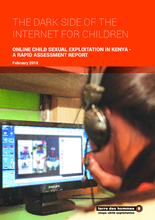EXECUTIVE SUMMARY
A decade of steady urbanisation, the spread of Internet infrastructure such as mobile broadband, and the growing availability of low-cost smartphones and tablets, have contributed to a remarkable rise in Internet and Information and Communication Technologies usage in East Africa, especially in Kenya. Unfortunately, this digitally advanced environment represents a double-edged sword. Increased mobile phone penetration and internet access have given rise to a set of conditions that have made children more vulnerable to Online Child Sexual Exploitation (OCSE). Online child sexual exploitation is the broad phenomenon of the use of the Internet to exploit children sexually. According to the FBI, there are an estimated 750,000 individuals looking to connect with children across the globe for sexual purposes online at any moment. This has also given rise to a specific phenomenon known as live Online Child Sexual Exploitation. This form of OCSE is conducted via the internet where adults offer payment or other forms of rewards to view, and in many cases, direct live-stream video footage of children performing sexual acts in front of a webcam or cellphone camera.
As technology advances, mobile phone penetration rises, and handsets become more and more affordable, there is a strong need to investigate and better understand the state of online child sexual exploitation in East Africa. Terre des Hommes Netherlands has conducted this preliminary study to examine if there is evidence of OCSE in Kenya. This report is a first step in better understanding the subject and ultimately addressing online child sexual exploitation in the region; Kenya being a regional hub was picked as the maiden country. This study has established that there is strong evidence that OCSE is occurring in Kenya through various forms. The research also confirms that there are circumstances which favour the growth and expansion of OCSE, such as the absence of a clear and enforceable regulatory framework governing cybercafe operators.
Based on this study and its global expertise in uncovering (live) OCSE, Terre des Hommes Netherlands calls for a holistic approach combating OCSE. The organisation is prepared and well-positioned to work with the Government of Kenya, local civil society organisations, the private sector, communities, and children themselves before the phenomenon affects more and more children in Kenya. This report includes key recommendations which provide an entry point into, among other things, how current law enforcement mechanisms and institutions in Kenya might be strengthened to prevent and respond to OCSE in future. Now is the time for government, civil society organisations and other stakeholders to work proactively and collectively against OCSE, so that their actions can be preventative rather than attempts at a response after the phenomenon has widely spread.

